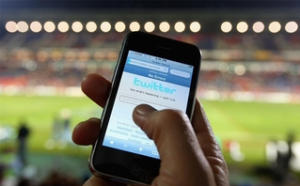 A wise football coach (okay, Jerry Glanville) once said that the NFL stood for “Not For Long.”
A wise football coach (okay, Jerry Glanville) once said that the NFL stood for “Not For Long.”
In hockey, the NHL stands for Not Here Long, especially when it comes to goaltenders, the league’s head coaches and social media mavens.
Yes, the employees who get paid to Tweet, Pin, use Facebook, filter photos through Instagram and shoot YouTube videos for your favorite team. The job that you’d gladly accept and do for free. The one that sports business expert Darren Rovell called the career of the future for somebody looking to break into the industry.
For a coach, Not Here Long means ‘you’re fired,’ it means a hefty raise, better hours and fewer ticket requests for social managers who wind up leaving their posts.
When clubs create a position specific to social media, it’s usually at the entry level where hundreds of resumes flood HR for a job that pays just above the poverty line. It doesn’t take into account that most of the league’s social minds have been ambitious 20 and 30-somethings who have the opportunity to broadcast to a mass audience on a daily basis. These individuals are also subject-matter experts in a cross-departmental function and help set, if not define strategy for marketing campaigns, ticket sales, sponsorship activation and fan / community relations.
Talk about a resume booster.
Poverty line living is an accepted part of many entry-level sports jobs, especially those in ticket sales and marketing. The public nature of managing a team’s social community isn’t like that. The reality is that PR agencies, commercial brands and recruiters dangle mid-to-senior level salaries at you just because somebody happens to be a fan.
 How much a Community Manager pulls in is usually dependent on the brand. For those with the audience size on par with an NHL club (500,000), this is upwards of $60-70,000 in the non-sports, private sector. At the University of Michigan, the Social Media Director is a six-figure position.
How much a Community Manager pulls in is usually dependent on the brand. For those with the audience size on par with an NHL club (500,000), this is upwards of $60-70,000 in the non-sports, private sector. At the University of Michigan, the Social Media Director is a six-figure position.
The league’s pending social problem isn’t about dollars and cents. It’s about staying competitive in the evolving marketplace and offering continuation to fans and corporate clients. It’s about building locker room relationships to the point where the General Manager occasionally lets you fly on the team charter. It’s about sitting in a meeting with major sponsors and brainstorming new ways to leverage emerging platforms and strengthen the partnership. It’s about understanding a developing trend like second-screen activation and how it could possibly create new revenue streams.
This role has developed at the team level faster than any owner or HR person expected it to. Three clubs, the Boston Celtics, Los Angeles Kings and San Francisco Giants are viewed as head-over-heels above the rest, having slotted the position at the Director level, letting the individuals who oversee the feeds (@Celtics, @LAKings and @SFGiants) conduct year-round speaking engagements as an extension of the brand.
We’re not irreplaceable by any stretch of the imagination, but a team’s social media strategy isn’t as interchangeable as the team beat reporter, a videographer, or even a marketing manager. There were 80,000 journalism degrees handed out at U.S. colleges and universities in 2012. This, as the business model for print media continues to evaporate and companies spend millions of dollars trying to incorporate themselves into the social / news conversation.
 Those 80,000 graduates I speak of are bright and talented, especially when it comes to showing you clips of their work. When it comes to showing you a revenue stream from what they do, you’ll be lucky if eight have a legitimate answer.
Those 80,000 graduates I speak of are bright and talented, especially when it comes to showing you clips of their work. When it comes to showing you a revenue stream from what they do, you’ll be lucky if eight have a legitimate answer.
Storytelling isn’t an easy craft, but those working on the social side do so on a daily basis. They also have, at the NHL level, the intelligence and integrated knowledge to work with the many tentacles that social media provides. They understand how to weave content and sponsorship seamlessly, then describe what works using demographics, CPM’s,impressions, even TV ratings. They’re starting to tell the advertising people to allocate money for Facebook and to spend less on newspaper advertising. They aren’t just pulling off Tweet Your Seat giveaways, but selling it to a corporate partner who wants exclusivity in the space.
We’ve moved far beyond the notion that a Social Media Manager is someone who simply ‘Tweets all day.’ Teams need to adjust their hiring practices to meet the integrated business nature of the position in 2013.
Comment below on where you see the role of social media in sports evolving. Like our Facebook page and join the conversation there and you can send us a tweet @SportsNetworker


Quality articles or reviews is the key to attract the users to visit
the site, that’s what this website is providing.